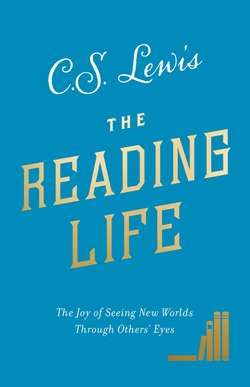Читать книгу The Reading Life: The Joy of Seeing New Worlds Through Others’ Eyes - Клайв Льюис, Клайв Стейплз Льюис, C. S. Lewis - Страница 9
ОглавлениеHOW TO KNOW IF YOU ARE A TRUE READER
An Experiment in Criticism
(from Chapter 1, “A Few and the Many”)
1. Loves to re-read books.
The majority never read anything twice. The sure mark of an unliterary man is that he considers ‘I’ve read it already’ to be a conclusive argument against reading a work. We have all known women who remembered a novel so dimly that they had to stand for half an hour in the library skimming through it before they were certain they had once read it. But the moment they became certain, they rejected it immediately. It was for them dead, like a burnt-out match, an old railway ticket, or yesterday’s paper; they had already used it. Those who read great works, on the other hand, will read the same work ten, twenty or thirty times during the course of their life.
2. Highly values reading as an activity (versus as a last resort).
Secondly, the majority, though they are sometimes frequent readers, do not set much store by reading. They turn to it as a last resource. They abandon it with alacrity as soon as any alternative pastime turns up. It is kept for railway journeys, illnesses, odd moments of enforced solitude, or for the process called ‘reading oneself to sleep’. They sometimes combine it with desultory conversation; often, with listening to the radio. But literary people are always looking for leisure and silence in which to read and do so with their whole attention. When they are denied such attentive and undisturbed reading even for a few days they feel impoverished.
3. Lists the reading of particular books as a life-changing experience.
Thirdly, the first reading of some literary work is often, to the literary, an experience so momentous that only experiences of love, religion, or bereavement can furnish a standard of comparison. Their whole consciousness is changed. They have become what they were not before. But there is no sign of anything like this among the other sort of readers. When they have finished the story or the novel, nothing much, or nothing at all, seems to have happened to them.
4. Continuously reflects and recalls what one has read.
Finally, and as a natural result of their different behaviour in reading, what they have read is constantly and prominently present to the mind of the few, but not to that of the many. The former mouth over their favourite lines and stanzas in solitude. Scenes and characters from books provide them with a sort of iconography by which they interpret or sum up their own experience. They talk to one another about books, often and at length. The latter seldom think or talk of their reading.
It is pretty clear that the majority, if they spoke without passion and were fully articulate, would not accuse us of liking the wrong books, but of making such a fuss about any books at all. We treat as a main ingredient in our well-being something which to them is marginal. Hence to say simply that they like one thing and we another is to leave out nearly the whole of the facts. If like is the correct word for what they do to books, some other word must be found for what we do. Or, conversely, if we like our kind of book we must not say that they like any book. If the few have ‘good taste’, then we may have to say that no such thing as ‘bad taste’ exists: for the inclination which the many have to their sort of reading is not the same thing and, if the word were univocally used, would not be called taste at all …
Many people enjoy popular music in a way which is compatible with humming the tune, stamping in time, talking, and eating. And when the popular tune has once gone out of fashion they enjoy it no more. Those who enjoy Bach react quite differently. Some buy pictures because the walls ‘look so bare without them’; and after the pictures have been in the house for a week they become practically invisible to them. But there are a few who feed on a great picture for years. As regards nature, the majority ‘like a nice view as well as anyone’. They are not saying a word against it. But to make the landscapes a really important factor in, say, choosing the place for a holiday—to put them on a level with such serious considerations as a luxurious hotel, a good golf links, and a sunny climate—would seem to them affectation.
